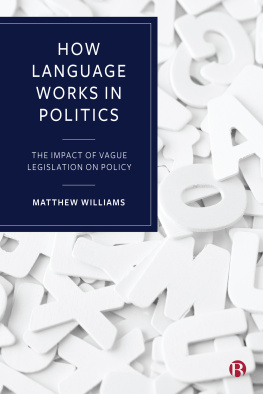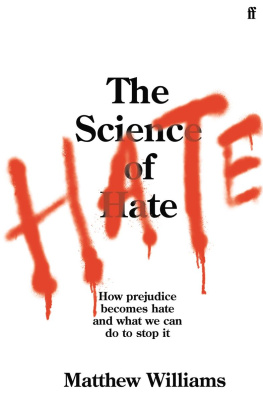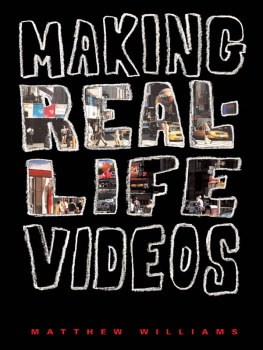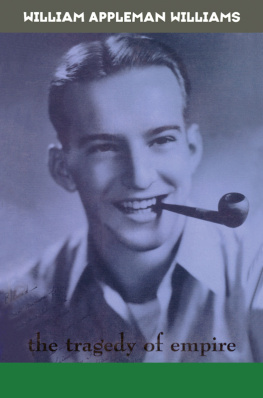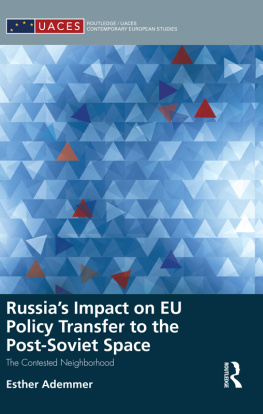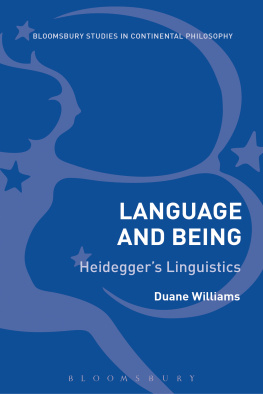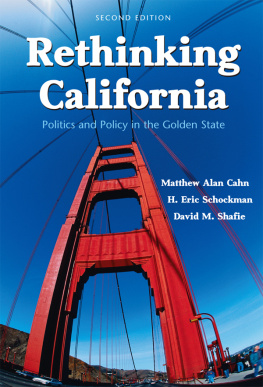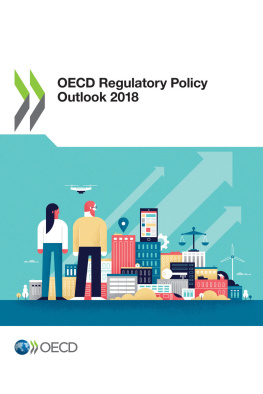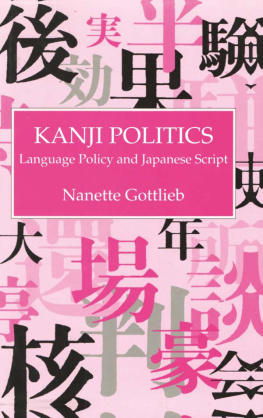First published in Great Britain in 2018 by
Bristol University Press 1-9 Old Park Hill Bristol BS2 8BB UK Tel +44 (0)117 954 5940 www.bristoluniversitypress.co.uk
North American office: Bristol University Press c/o The University of Chicago Press 1427 East 60th Street Chicago, IL 60637, USA t: +1 773 702 7700 f: +1 773-702-9756 e:
Bristol University Press 2018
British Library Cataloguing in Publication Data
A catalogue record for this book is available from the British Library
Library of Congress Cataloging-in-Publication Data
A catalog record for this book has been requested
978-1-5292-0020-1 hardback
978-1-5292-0021-8 ePdf
978-1-5292-0023-2 ePub
978-1-5292-0024-9 Mobi
The right of Matthew Williams to be identified as author of this work has been asserted by him in accordance with the Copyright, Designs and Patents Act 1988.
All rights reserved: no part of this publication may be reproduced, stored in a retrieval system, or transmitted in any form or by any means, electronic, mechanical, photocopying, recording, or otherwise without the prior permission of Bristol University Press.
The statements and opinions contained within this publication are solely those of the author and not of the University of Bristol or Bristol University Press. The University of Bristol and Bristol University Press disclaim responsibility for any injury to persons or property resulting from any material published in this publication.
Bristol University Press works to counter discrimination on grounds of gender, race,
disability, age and sexuality.
Cover design by blu inc.graphics ltd.
Readers Guide
This book has been optimised for PDA.
Tables may have been presented to accommodate this devices limitations.
Image presentation is limited by this devices limitations.
I have long been fascinated (even mildly obsessed) by politics. However, this is not for highfalutin reasons. Politics, to me, is a sometimes-grubby soap opera. Like a box set, I cannot, dare not, tear my eyes away from the drama. In my doctoral research, I became fixated on what I saw as a foundational battle in this drama the battle for supremacy over language. In any country purporting to be democratic, it is language that is the ultimate medium of conflict. Violence and intimidation can, it is true, be used democratically, but only when abetted by rules of law. As such, years of tense bargaining and swirling multilayered ambitions are captured and promulgated through humble words.
When considering representative democracy, a principal requirement is therefore that language represents reality to some extent. It is common to define representativeness as the re -presentation of interested parties by competent proxies at negotiations over scarce resources. However, those proxies must also conclude negotiations with a construction of words that represents something meaningful, and legitimate. Words, their grammatical arrangement and their range of possible meanings are at the foundations of political dispute. Even storing these words for future generations is fastidiously regulated. As recently as March 2017, it was finally accepted that Acts of Parliament need not be recorded on durable vellum, after half a millennium of so storing them. Acts will continue to be stored, of course, but on a modern synthetic medium, rather than calf-skin.
My particular route into this battle over language was via the study of judges in British politics. Scorn was poured by some in the media and government on judges as unwelcome interlopers in public policy. Criticism was especially stern when judges ruled against the government and in favour of asylum seekers and immigrants. I wanted to work out why judges were interloping. A rudimentary hypothesis emerged when I examined what precisely it is that judges do, and have tried to do since as far back as Solomon. Adjudication the only truly pre-democratic mode of governing to have survived the 20th century is at essence an independent-minded arbitration over what is true, and, where possible, what is just. Truth and justice have, for centuries, been recorded in publicly accessible messages passed between government and governed. My contention was that judges will arbitrate more creatively if these messages from government to governed are less meaningful. This contention underpins the book. Political language is less determinate today than it was, with various significant policy consequences.
There are rich theories that have long considered the interplay of reality with our perceptions and presentations of it. My aim was to take advantage of modern computing to measure such uses of language comprehensively. This book is hence a work of history, but with a 21st-century twist of lime. In these pages, I present machine-reading results from practically every primary public law enacted by Parliament since 1900. That amounts to some 41.5 million words communicated to British citizens over more than a century. There are also similarly detailed analyses of immigration cases, homelessness provision, anti-discrimination laws and national constitutions. These entirely new analyses reveal manifold difficulties faced by politicians in finding a form of words that is, on its face, meaningful. Considering recent hand-wringing at democratic decline and rising populism, these pages reveal a particular pathology of 21st-century statecraft. This pathology was revealed to me through a striking irony. By programming a computer to read everything the Mother of Parliaments has said since 1900, I was forced to use language with absolute precision. Yet, I uncovered a pattern of increased indeterminacy in political communication. As we continue into the Information Revolution, it was certainly a surprise to me that while clarity is valued in private-sector information management, in the public sector, we are seeing an increased reliance on loose language and individual interpretative discretion.
There are some alarming implications. If politicians continue to under-represent truth and justice in their uses of language, citizens may not trust the authority of any public utterance. In an age of post-truth, #fakenews and disdain for expertise, much may be consequent on communicative indiscipline. However, my aim is not to chide. Political parties in advanced democracies are generally well aware that they struggle to connect with voters and speak to them plainly. In the contexts of transnational capital flows, ecological threats and global terrorism, it is difficult to construct meaningful statements of how a country, on its own, should perceive its own reality. It is contextual uncertainty that overwhelms textual clarity, therefore. Furthermore, politicians are not rewarded for straight talk under these circumstances. A truth-telling Cassandra, ironically, is hard to believe because their messages appear so austere and pessimistic. However, the opposite situation, of Pollyanna-politicians painting in rosy hues, does breed cynicism when reality bites.
This book is empirical history. It describes what has been, not what ought to become. There is nonetheless an unavoidable lesson to draw that any citizen keen to enhance democratic performance needs to consider how language is used by the powerful to represent reality and justice. Besides what institutions say, it matters how they say it, and how the rules of politics are set up to encourage politicians to speak plainly to citizens. Obsessive observers of politics, such as myself, may revel (and even modestly profit) from dramatic unpredictability. However, to solve knotty social problems, we need a form of words that is accessible and functional. Text needs, at least in part, to dominate context.


